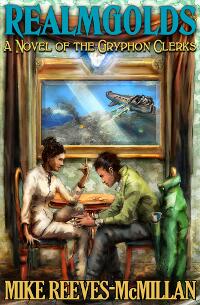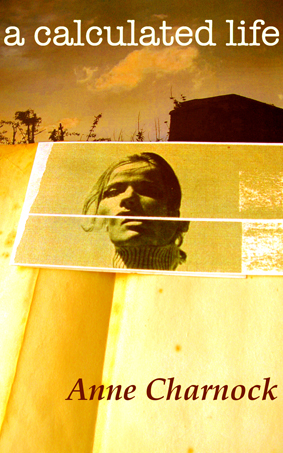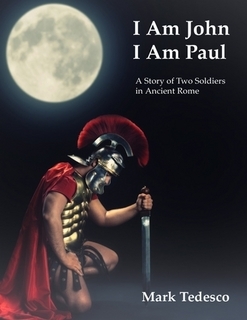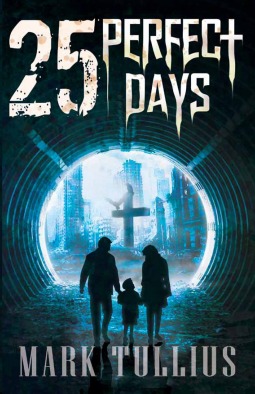Gelton isn't the revolutionary type. If you asked him, it would be the last thing he would ever use to describe himself - if you could get the gefling to answer at all. When he gets entangled in events larger than his own story, he finds that he's got more than a few things to learn about himself.
Part speculative history, part fantasy, and definitively steampunk, Secrets
is the first novel in the Clockwork Skies
series. Action packed and full of political intrigue, romance, and richly detailed fantasy settings, Secrets
will entice you from the first page and keep you guessing until the last.
Clockwork Skies: Secrets starts strong. The reader is introduced to Gelton, a gefling in the services of a high-ranking Braelish ambassador. The relationship between Gelton and Ambassador Grayson is charming, paternal, and the most well executed in the whole book. Grayson both nurtures and skillfully handles Gelton’s childlike wonder and curiosity. Gelton is especially bright for a gefling.
J Cunningham never really describes what a gefling is/looks like outside of phrases such as “single meter height”, “not overly strong”, and “one of the most clever of all races.” I’m assuming that geflings are similar to gnomes (but that is just my assumption).
Some authors can get away with this vagueness. Most notably, Dickens did this with the character of Pip in
Great Expectations. Dickens succeeds because the character of Pip is one of transformation. While Gelton may indeed be a character of transformation, he is no Pip.
The extremely, exceptionally talented Gelton (Cunningham never wastes an opportunity to have another character remind you of how clever Gelton is) does go through a series of transformations. But rather than having these transformations bubble up organically from within Gelton, they are almost exclusively a result of some sort of
deus ex machina (e.g. Gelton loses his fear of public speaking and social awkwardness thanks to the mystical workings of a Elvorian shaman).
While I’m on the subject of
deus ex machina, Cunningham uses it almost as a crutch. For example, there is a scene where two geflings are on the run and hide in a barn. The farmer finds them and instead of turning them in (or worse) invites them inside and his wife feeds them. They give them a place to stay for the night and clothing. Oh, and this benevolent farm couple (who are never mentioned previously or again) just so happen to have the key to unlocking a puzzle in the form of a book of braille that apparently was/is for their daughter. Before this intervention, it was obvious that even our super smart gefling was not going to be able to solve this puzzle.
One of my biggest gripes about the book is the setting. The story takes place during the Victorian era, during which there was an event known as the Great Opening, after which the dwarves, geflings, and Elvorians (ice elves?) revealed their presence to the world. Something about the Great Opening caused all the water in the world to become toxic. Cunningham never explains why but the rain/fog is now acidic (which in itself could be a very awesome plot line if executed correctly) and the only drinkable water is from ice, which is in the control of the Elvorians.
This setting device can be done with success and Kim Harrison’s
The Hollows series is a great example of this. But whereas Harrison keeps things familiar within a political/social/economically changing setting, Cunningham changes without reason or direction. Rather than use British, Irish, Scottish, Cunningham uses Braelish, Ire’lads, and Scot’rs. It was just too much for me personally.
Author and blogger Mike Reeves-McMillian (whose book
Realmgolds we previously reviewed) wrote that there are basically
three type of steampunk: brass romance, pulp adventure, and steampunk that uses the setting to explore technological advancements’ effects on the social, political, and personal interactions. With a plot that ultimately goes nowhere,
Clockwork Skies: Secrets nobly attempts to be all three but ultimately falls short on each level. The multiple layers of alienness in the setting and Cunningham’s penchant for
deus ex machina tests this reader’s suspension of disbelief to its breaking point.
The book is available from
Amazon.
For more reviews from the Bookworm, stop by the
Bookworm's Fancy!

 DED: It should come as no surprise that my selection for the best book of 2013 is Anne Charnock's A Calculated Life. It is an excellent character study of a young augmented woman named Jayna who works for a global trends analytical firm. Her journey of self-discovery is what makes this story. Charnock deftly bonds the reader to Jayna by granting us unfettered access to her mind, thus making us her mute confidant.
DED: It should come as no surprise that my selection for the best book of 2013 is Anne Charnock's A Calculated Life. It is an excellent character study of a young augmented woman named Jayna who works for a global trends analytical firm. Her journey of self-discovery is what makes this story. Charnock deftly bonds the reader to Jayna by granting us unfettered access to her mind, thus making us her mute confidant. Surgeon Robert Emmerling’s death at age 86 in The Girl in the Photo’s opening chapter serves as a catalyst for a series of discoveries by his two children. While clearing out their father’s home, David and Abbie find a memoir he had written about being stationed in Japan during the Korean War, years before he met their mother. It describes his involvement with Masami, a woman he met there. David and Abbie also turn up Masami’s photograph and a letter she had written to Dr. Emmerling after he returned to the U.S. This previously unknown episode in their father’s life raises questions for the siblings: Why did the romance end, and what happened to Masami afterward?
Surgeon Robert Emmerling’s death at age 86 in The Girl in the Photo’s opening chapter serves as a catalyst for a series of discoveries by his two children. While clearing out their father’s home, David and Abbie find a memoir he had written about being stationed in Japan during the Korean War, years before he met their mother. It describes his involvement with Masami, a woman he met there. David and Abbie also turn up Masami’s photograph and a letter she had written to Dr. Emmerling after he returned to the U.S. This previously unknown episode in their father’s life raises questions for the siblings: Why did the romance end, and what happened to Masami afterward?

 A young woman
named "Cross" is sent out into the post-apocalyptic wasteland by her father to find "the soldier", a man
believed to hold the key to saving their plague-ridden village. Before the desert can claim her, a
warrior-priest named "Zero" discovers Cross and learns of her mission. When he spies a silver cross,
the symbol of his brotherhood, glinting in her hair, he pledges his sword to defend her.
A young woman
named "Cross" is sent out into the post-apocalyptic wasteland by her father to find "the soldier", a man
believed to hold the key to saving their plague-ridden village. Before the desert can claim her, a
warrior-priest named "Zero" discovers Cross and learns of her mission. When he spies a silver cross,
the symbol of his brotherhood, glinting in her hair, he pledges his sword to defend her.


 Standing Together is the sequel to
Standing Together is the sequel to 

 A totalitarian state doesn’t just happen overnight. It’s a slow, dangerous slide. 25 Perfect Days chronicles the path into a hellish future of food shortages, contaminated water, sweeping incarceration, an ultra-radical religion, and the extreme measures taken to reduce the population.
A totalitarian state doesn’t just happen overnight. It’s a slow, dangerous slide. 25 Perfect Days chronicles the path into a hellish future of food shortages, contaminated water, sweeping incarceration, an ultra-radical religion, and the extreme measures taken to reduce the population.
